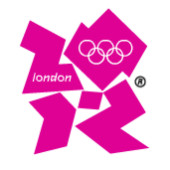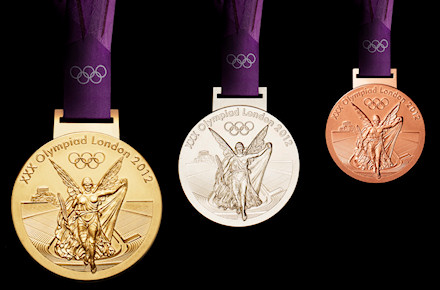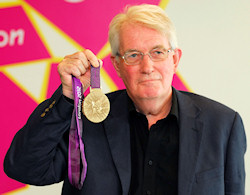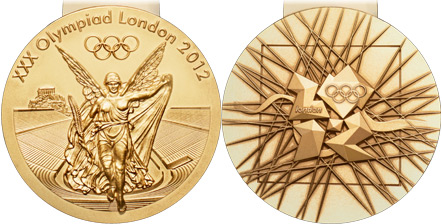You Are Here: Home » Major Table Tennis Tournaments » 2012 Olympic Games Medals
2012 Olympic Games Medals
for Table Tennis
The Royal Mint in the UK made all the 2012 Olympic Games medals. Here are the details...
By Martin Hughes
Owner and Editor

The London Organising Committee of the Olympic Games and Paralympic Games (LOCOG) announced that the Royal Mint would produce around 4,700 victory medals at their headquarters in Llantrisant, South Wales, for the London 2012 Olympic and Paralympic Games.
This of course included the table tennis medals which were awarded to the first three places in the men's singles, the women's singles, the men's team event and the women's team event.
^ Top of page ^
So what did people say at the announcement?
Comments on the 2012 Olympic Games medals
The CEO of the London Organising Committee of the Olympic Games and Paralympic Games, Paul Deighton, said:
"We're delighted to be working with the Royal Mint, a company established in the UK for 1,100 years, to produce the London 2012 victory medals.
The Olympic and Paralympic medals are presented to elite athletes at the biggest sporting events in the world - a moment which represents the pinnacle of their career and we're pleased to announce that they will be produced in South Wales."
Adam Lawrence, Chief Operating Officer at the Royal Mint, said:
"As a UK manufacturer, this is great news for the country, the 800 people we employ and our suppliers."
^ Top of page ^
So what did they say the 2012 Olympic Games medals would look like?
Design of the 2012 Olympic Games medals
The gold, silver and bronze medals, which are awarded to athletes in the London 2012 Victory Ceremonies watched by a worldwide audience, would be designed by a UK-based artist.
LOCOG said that they were short-listing invited artists and an announcement on the chosen design would be made in the summer of 2011.
^ Top of page ^
So how did the deal between LOCOG and the Royal Mint arise?
Competitive Tender
The deal between LOCOG and the Royal Mint was signed following a competitive tender process.
98% of contracts awarded by LOCOG and the ODA went to businesses based in the UK.
LOCOG's Games-time procurement process saw £700m worth of contracts awarded before the summer of 2012.
^ Top of page ^
And in July 2011 the...
2012 Olympic Games medals were unveiled
The London 2012 Olympic Games medals were unveiled to the world at a special ceremony in Trafalgar Square, London on 27 July 2011 which marked the start of the one year countdown to the London 2012 Olympic Games.

Weighing in at 400g (0.88lbs) the medals were 85mm (3.35in) in diameter and 7mm (0.28in) thick, and were the largest Summer Olympics medals ever produced.
The individual sport and discipline were engraved onto the rim of each medal.
More than 2,100 Olympic medals were presented in 302 Olympic victory ceremonies in more than 30 venues over 16 days of competition.
The Olympic medals were designed by British artist David Watkins who is an established artist in the field of decorative art and they went into production in late 2011 at the Royal Mint's headquarters in Llantrisant, South Wales.
^ Top of page ^
So how was British artist David Watkins chosen as the designer?
David Watkins

Artists were invited to tender by the London Organising Committee of the Olympic Games and Paralympic Games (LOCOG), having been chosen by arts bodies from across the UK and a panel made up of experienced creative leaders and sports representatives.
LOCOG also worked closely with the British Museum's Keeper of Coins and Medals, Philip Attwood, to look at the symbolic history of medals in Europe in the last century, and in particular, medals that held stories that travelled symbolically from the front of the medal to the back.
Six artists were subsequently selected for the second stage of design and development and asked to develop their designs to create a narrative that went from front to back.
From this, the panel felt that David Watkins' design befitted the athletes achievements with its jewel like depiction of the logo clearly defining the arrival of sport and the Games in London.
David Watkins said...
"It is exciting to think that the finest athletes in the world will be wearing my medal design.
Its key symbols juxtapose, front and back, the goddess Nike for the spirit and tradition of the Games, and the River Thames for the city of London.
I hope the medal will be enjoyed and treasured as a record of great personal achievements in 2012."
^ Top of page ^
So let's take a look at the design and what it represents...
2012 Olympic Games medal design

The official explanation of the medal design was as follows...
The Olympic medals' circular form is a metaphor for the world and the front of the medal always depicts the same imagery at the summer Games - the Greek Goddess of Victory, Nike, stepping out of the Parthenon to arrive in the Host City.
The design for the reverse of the London 2012 Olympic medals contains five main symbolic elements:
- The dished background suggests a bowl similar to the design of an amphitheatre
- The core emblem is an architectural expression, a metaphor for the modern City, or as a geological metaphor as a tough crystalline growth which is deliberately jewel like
- The grid brings both a pulling together and sense of outreach on the design - an image of radiating energy that represents the athletes' achievements and effort
- The River Thames is a symbol for London and also suggests a fluttering baroque ribbon and adds a sense of celebration
- The square is the final balancing motif of the design, opposing the overall circularity of the design and emphasising its focus on the centre and reinforcing the sense of 'place' as in a map inset
Wow...that's some explanation!!
^ Top of page ^
So what did people say about the 2012 Olympic Games medals designs when they were launched?
Comments on the 2012 medal designs
Seb Coe, LOCOG Chairman, said:
"I hope that seeing the design of the London 2012 Olympic medals will be a source of inspiration for the thousands of athletes around the world who are counting down the year before they compete at the greatest show on earth.
All of our preparations are focused on ensuring the athletes are at the heart of the Games, and I believe that through this rigorous process the panel of experts have selected an artist and a design for medals that all athletes would be proud to own."
IOC President Jacques Rogge said:
"Highlighting the effort and achievement of the athletes, as well as the city where the Games are held, these beautiful medals will be a fitting reward for the Olympic medallists of 2012.
It is the pinnacle of a sporting career to become an Olympic champion but I am confident that receiving one of these medals will make it all the more special in London next year.
Congratulations to LOCOG for creating a design that will inspire the Olympians of 2012."
^ Top of page ^
And finally, here are a few London 2012 medal facts...
London 2012 medal facts
Here are six London 2012 Medals facts:
- The Olympic medals are designed especially for each individual Olympic Games by the host city's organising committee
- It was not until the 1904 Olympics in St. Louis, USA that the Games introduced the gold medal as the prize for first place
- The London 2012 Olympic medals will weigh 375-400g, be 85mm in diameter and 7mm thick
- The gold medal is made up of 92.5% silver, 1.34% Gold with the remainder copper (a minimum of 6g of gold)
- The silver medal is made up of 92.5% silver with the remainder copper
- The bronze medal is made up of 97.0% Copper, 2.5% Zinc and 0.5% Tin
^ Top of page ^
^ Top of page ^
You Are Here: Home » Major Table Tennis Tournaments » 2012 Olympic Games Medals
